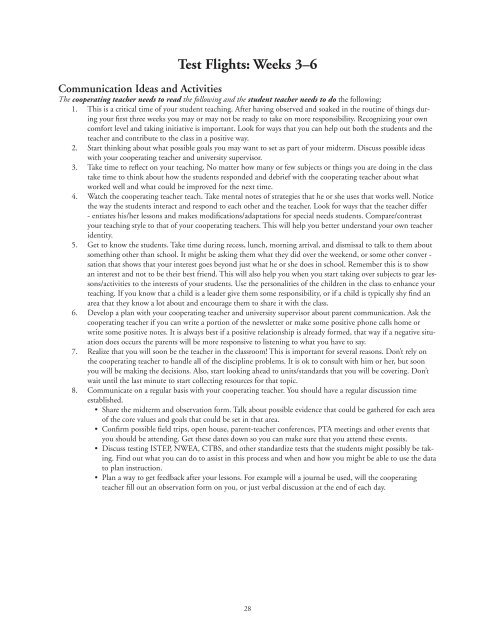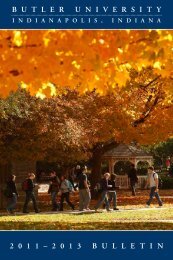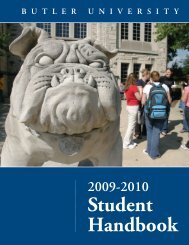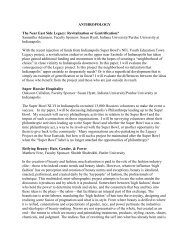Student Teaching Handbook - Butler University
Student Teaching Handbook - Butler University
Student Teaching Handbook - Butler University
Create successful ePaper yourself
Turn your PDF publications into a flip-book with our unique Google optimized e-Paper software.
Test Flights: Weeks 3–6<br />
Communication Ideas and Activities<br />
The cooperating teacher needs to read the following and the student teacher needs to do the following:<br />
1. This is a critical time of your student teaching. After having observed and soaked in the routine of things during<br />
your first three weeks you may or may not be ready to take on more responsibility. Recognizing your own<br />
comfort level and taking initiative is important. Look for ways that you can help out both the students and the<br />
teacher and contribute to the class in a positive way.<br />
2. Start thinking about what possible goals you may want to set as part of your midterm. Discuss possible ideas<br />
with your cooperating teacher and university supervisor.<br />
3. Take time to reflect on your teaching. No matter how many or few subjects or things you are doing in the class<br />
take time to think about how the students responded and debrief with the cooperating teacher about what<br />
worked well and what could be improved for the next time.<br />
4. Watch the cooperating teacher teach. Take mental notes of strategies that he or she uses that works well. Notice<br />
the way the students interact and respond to each other and the teacher. Look for ways that the teacher differ<br />
- entiates his/her lessons and makes modifications/adaptations for special needs students. Compare/contrast<br />
your teaching style to that of your cooperating teachers. This will help you better understand your own teacher<br />
identity.<br />
5. Get to know the students. Take time during recess, lunch, morning arrival, and dismissal to talk to them about<br />
something other than school. It might be asking them what they did over the weekend, or some other conver -<br />
sation that shows that your interest goes beyond just what he or she does in school. Remember this is to show<br />
an interest and not to be their best friend. This will also help you when you start taking over subjects to gear lessons/activities<br />
to the interests of your students. Use the personalities of the children in the class to enhance your<br />
teaching. If you know that a child is a leader give them some responsibility, or if a child is typically shy find an<br />
area that they know a lot about and encourage them to share it with the class.<br />
6. Develop a plan with your cooperating teacher and university supervisor about parent communication. Ask the<br />
cooperating teacher if you can write a portion of the newsletter or make some positive phone calls home or<br />
write some positive notes. It is always best if a positive relationship is already formed, that way if a negative situation<br />
does occurs the parents will be more responsive to listening to what you have to say.<br />
7. Realize that you will soon be the teacher in the classroom! This is important for several reasons. Don’t rely on<br />
the cooperating teacher to handle all of the discipline problems. It is ok to consult with him or her, but soon<br />
you will be making the decisions. Also, start looking ahead to units/standards that you will be covering. Don’t<br />
wait until the last minute to start collecting resources for that topic.<br />
8. Communicate on a regular basis with your cooperating teacher. You should have a regular discussion time .<br />
established.<br />
• Share the midterm and observation form. Talk about possible evidence that could be gathered for each area<br />
of the core values and goals that could be set in that area.<br />
• Confirm possible field trips, open house, parent-teacher conferences, PTA meetings and other events that<br />
you should be attending. Get these dates down so you can make sure that you attend these events.<br />
• Discuss testing ISTEP, NWEA, CTBS, and other standardize tests that the students might possibly be taking.<br />
Find out what you can do to assist in this process and when and how you might be able to use the data<br />
to plan instruction.<br />
• Plan a way to get feedback after your lessons. For example will a journal be used, will the cooperating<br />
teacher fill out an observation form on you, or just verbal discussion at the end of each day.<br />
28

















